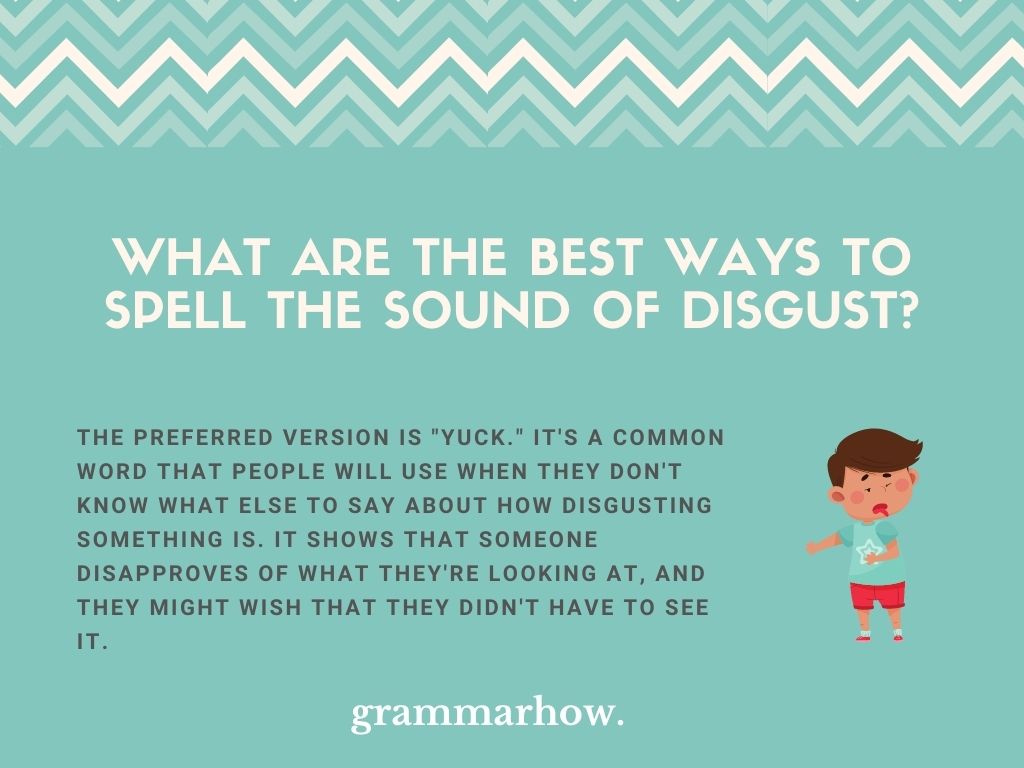
The sound of disgust might sound like an odd concept at first, but you’ve probably heard it before. If you’ve ever been disgusted by something, you might have let out one of the sounds we’re about to cover in this article.
There are some great onomatopoeia spellings for the sound of disgust. Here are some of the best ones:

The preferred version is “yuck.” It’s a common word that people will use when they don’t know what else to say about how disgusting something is. It shows that someone disapproves of what they’re looking at, and they might wish that they didn’t have to see it.
“Yuck” is a great way to show you are disgusted. It refers to the throaty, sick sound that people make when they are disgusted, but we can also pronounce it as a word. It’s one of the easiest ways to share your disgust with someone.
While using it as a word isn’t strictly considered to be onomatopoeia, that doesn’t mean it’s not a great choice. The word only exists because it developed from the gagging sound that people make when they are disgusted by something. That’s why it’s common today.
“Ew” is one of the most common ways to express disgust. It’s a great onomatopoeia choice because everyone (native and non-native speakers) know what it implies. “Ew” is a universal sound, so it’s clear what you’re trying to convey when you use it.
You could go to any country and use “ew” when you’re disgusted. Most people around you would understand that you are not thrilled with whatever you’re talking about.
“Ick” is a funny way for people to show they’re disgusted. We can use it when we don’t want to encourage someone who might have done something disgusting.
It’s a simple way of showing someone that they need to change their attitude. “Ick” is also becoming quite popular in popular culture, where people talk about giving each other the “ick” (meaning they do things to put other people off their character).
“Blech” is a good way of demonstrating your disgust with a quick sound. We use the hard “ch” ending of the word to show that it’s a throaty sound. This idea shows that we are not fond of something, and we want to make sure people know we’re disgusted in some way.
“Bleurgh” is an alternative form of “blech.” We can use the “gh” ending to show that there’s a bit more sickness about the sound. It implies that it’s more guttural, which generally works best when you’re sharing your disgust with something on a deeper level.
“Ugh” is another common sound people make when disgusted. It refers to the sharp exhale that comes with a brief noise when you don’t know what else to say. “Ugh” means that you can’t comment on how disgusted you are with something that you’ve seen.
“Gag” is a good choice of verb that helps us describe the noise of disgust. This time, we refer to the action of someone gagging (i.e. pretending to force up some sick).
It’s a very distinctive sound, and it’s usually enough for people around you to start gagging as well. It can be quite funny as a responsive sound, but you need to be careful who you use it around, as some people find it equally as disgusting.
“Retch” is another verb you can use to describe a sound. You use it when someone is making the noises that your throat produces before vomiting. If you don’t intend on vomiting, it can be a good noise to imitate to show you are disgusted with something.
Martin holds a Master’s degree in Finance and International Business. He has six years of experience in professional communication with clients, executives, and colleagues. Furthermore, he has teaching experience from Aarhus University. Martin has been featured as an expert in communication and teaching on Forbes and Shopify. Read more about Martin here.